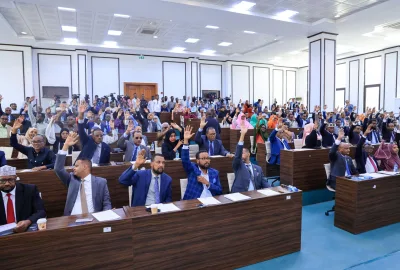Mogadishu, Somalia (April 8, 2024) – The Federal Government of Somalia’s Ministry of Fisheries and Blue…

Mogadishu, Somalia (April 8, 2024) – The Federal Government of Somalia’s Ministry of Fisheries and Blue Economy has issued a stern warning to all fishing companies and vessel owners operating within the country’s territorial waters, prohibiting trawling activities.
In a notice released on April 6th, the Ministry cited Article 31 of the Somali Federal Fishery Law, which strictly prohibits trawling — a fishing method that involves dragging large weighted nets along the seafloor. The ban aims to safeguard Somalia’s marine resources and protect the delicate ecosystems that sustain the nation’s fisheries.
“Any violations of this regulation may result in severe penalties, including fines, imprisonment, confiscation of caught fish products, and seizure of trawling equipment,” the ministry stated in the notice.
Somalia’s move to ban trawling underscores the growing global concern over the practice’s detrimental impact on marine environments. Trawling can indiscriminately capture non-target species, damage sensitive habitats like coral reefs and seagrass beds, and disrupt the seafloor, potentially affecting the entire marine food chain.
The Ministry emphasized the importance of sustainable fishing practices, urging all stakeholders to uphold their responsibility in preserving Somalia’s marine resources for current and future generations.
Experts worldwide have welcomed Somalia’s decisive action, praising the country for prioritizing the long-term health of its marine ecosystems over short-term economic gains. The ban aligns with global efforts to promote responsible and sustainable fisheries management.
Failure to comply with the Somali Federal Fishery Law will result in legal action against violators, the Ministry warned. As Somalia aims to protect its rich marine biodiversity, the international community will closely monitor the enforcement of this ban and its implications for regional and global fisheries management.
HORSEEDMEDIA







